Some people may need to take extra care in considering travel or preparing for travel. If you find yourself in one of these categories, it is important to make sure the doctor advising you knows about your needs.
Travelling when you're pregnant
If you're pregnant, consult with both your lead maternity carer and a travel medicine doctor before making any travel decisions. Depending on your stage of pregnancy, pre-existing medical conditions, and travel plans, you may want to take additional precautions or even postpone your trip. For example, if you're pregnant and have a serious pre-existing medical condition, it may not be wise to travel to developing countries. In general, the safest time for a pregnant person to travel is during the second trimester (18–24 weeks). If you're in your third trimester, you should typically plan to stay closer to home to guarantee access to medical care if problems arise, such as high blood pressure, swelling, or going into labour 3 weeks or more before your due date (premature labour).
Travelling with babies and small children
Traveling with children will require extra thought and planning. Many travel-related vaccinations and preventive medicines that are used for adults are not recommended for young children. Talk with your child’s doctor about your travel plans. They can give you recommendations on which vaccines or medicines are safe for your child. You may also want to consider bringing your child’s car seat, as the availability and quality of such seats abroad may be limited. You can learn more about this topic from the section traveling safely with infants and children.
Learn more about flying with children and infants. (external link)
Travelling with a disability
Generally, travellers with stable, ongoing disabilities should prepare for an international trip in much the same way as anyone else would. However, if you have a disability and are planning an international trip, you should take some extra steps to ensure a safe and accessible trip.
- Consult with your travel agent or tour operator and make sure that resources are available to meet your needs.
- See a travel medicine doctor, or a healthcare provider familiar with travel medicine, 3 to 6 months before you leave. They will tell you which vaccines or medicines you will need and give you additional recommendations that fit your needs.
- Research the resources available to people with disabilities in your destination.
Learn more about flying with a disability.(external link)
Travelling with a weakened immune systems
If your immune system is weakened from cancer, chemotherapy, medicines, or HIV/AIDS, talk to your doctor about the details of your travel plans. There may be added risks related to travel.
- If your current medical status is unstable or puts your health at serious risk, it may be recommended that you not travel or postpone your trip until you can travel more safely.
- Even if you can travel, you may or may not be able to have certain vaccines or take medications that are normally recommended for your destination or they may not be as effective.
- If you do get sick while traveling, your illness may be more severe or you may have added complications to your existing condition. Make sure that you fully understand all the risks involved with your travel plans and any ways to protect your health that your doctor recommends before you go.
Learn more about travelling when immunocompromised(external link).



 Image credit: Canva
Image credit: Canva Image credit: Canva
Image credit: Canva


